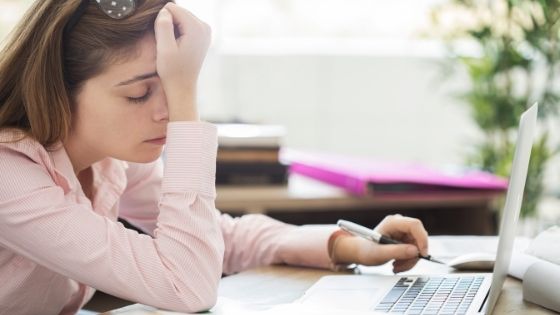How to not fall asleep? 21 Tips and Tricks to keep you awake!

Do you have trouble staying awake? If your answer is yes, then this article is for you. We’ve compiled a list of tips and tricks on how not to fall asleep and to help you stay awake during those long lectures or meetings. You might be surprised by how many things can keep us alert!
These are some simple ways that will help stop falling asleep and make the time go by faster. So next time you need to stay up late, try one of these methods! (Trusted sources 1*, 2*, 3*)
Keys to staying awake
Before we give our tips to stay awake, we have to admit that the best way to feel full of energy all day is a good night's sleep. If you sleep the right number of hours, your brain will disconnect and wake up with lots of energy. So for those days when you have trouble sleeping, here are some tips:
Go for a walk
Taking a break from work and going for a walk will help us to think better. It is also good for our circulation, and we can get some sunlight too.
Sleep with the natural light
Covering your window at night will make it harder for you to fall asleep. This is because the light helps our brain to know when we should sleep. If you cover your windows, your body can't read this signal, so it's more difficult to go fall asleep and stay asleep.
Leave early for work.
If you need to wake up early, do it! It will be a good way to start your day. You won't have any trouble getting out of bed or coffee, for that matter, and this could give you the energy throughout the entire day.
Exercise regularly for at least 30 minutes straight
You don't need to head out for a long run. Just 30 minutes of exercise are enough to keep you active throughout the day. It can be a quick jog in the morning or some push-ups while watching tv. Whatever works for you!
Do Yoga or meditate
Yoga is great because it helps us stay awake and energized throughout the entire day. It improves our mood and makes us feel good about ourselves. It also aligns our bodies so we can avoid backpedaling and posture problems.
Eating chewing gum
Some studies say chewing gum helps reduce drowsiness. This is because it gets the blood circulating and also stimulates certain parts of the brain. So the next time you feel like falling asleep, grab a stick of gum.
Moving, dancing, or exercising
Dancing or exercising generates three times more endorphins than taking a walk. That means ten minutes of dancing, for example, will give you an adrenaline boost that'll keep you awake and energetic all day long!
Drinking water
Our bodies are made up of 70% water. Drinking plenty of water throughout the day is important to feel good and have energy for everything we do in life. Dehydration can cause different symptoms, including fatigue, which means being properly hydrated will help you stay awake!
It's imperative to drink enough water during the day, so your body can stay hydrated and function better. The recommended amount is at least 8 glasses of water per day. To make it easier, keep a bottle of water in your car and sip it during the day or add some fresh lemon juice.
Breathing deeply
Deep breaths are the thing we need to breathe. Breathing helps us get oxygen in our body which can help us stay healthy and have more energy when we do something hard.
Listening to energetic music
Listening to music is a great way to disconnect for a short while. So put on the tunes and dance around your desk with abandon! It will definitely wake you up. But if you happen to be studying, we recommend using another technique lest an energy overload makes concentration difficult.
Take your eyes off the screen.

Working all day in front of a screen leads to eyestrain, which can cause eye irritation or head and back pain. Therefore, you should take the time out of your busy work schedule once every hour and look at something else aside from your computer screen.
Drink Lemon Water
- Pros: Very affordable and easy to obtain. Lemon is said to help improve focus. It makes you feel refreshed and is a great alternative to sugary snacks!
- Cons: The smell of lemon might be offensive for other people in close quarters
Drink a Cup of Coffee
Talking with someone over a cup of coffee can do wonders to help you feel alert and awake. It is not like sitting down to have your coffee which can make you sleepy because of its aroma.
- Pros: Caffeinated drinks are proven to increase focus-Coffee is very flavorful, and can be enjoyable.
- Cons: Caffeine can cause jitters if too much is consumed
Drinking a Cup of Tea
Green tea is a real energy drink without any caffeine in it. Therefore, it can keep us energized for a longer period of time.
- Pros: Tea has been shown to help aid in calming the mind and body-It keeps you hydrated, and can help ease your stress.
- Cons: Chamomile is the best for staying awake, but it tastes bitter, so you might not like it-You need to have a cup AND a hot water source. Teabags are useless without boiling water.
Be proactive
How to not fall asleep? If you know that it will be an active day for you, get some extra sleep the night before. Then, your body will thank you, and your brain is going to love all the energy it has to focus on the tasks at hand!!
Take a shower
Stand under cold water for 30 seconds before switching to hot water. Stand again for another 30 seconds each. Your capillaries should open up. Your blood vessels will increase! End on this with an ice bath at the end of it all; go back through in alternating cycles between heat and cold.
Switch tasks
In general, monotony can make it hard to believe that a person is alive during the day.
When you're feeling tired, it can be hard not falling asleep. Try experimenting with different items, so you know what's going on in your head sharp and concentrated. Place tasks that require higher energy and more activity for times when energy is needed!
Keep a healthy sleeping schedule.
Sleep cycles can be regulated by daylight. Daylight is an important factor in our circadian rhythms, and when we lack exposure to it, sleep disorders like insomnia are more likely to occur.
Research indicates that these problems may worsen with age as levels of melatonin decrease while total light pollution increases.
Maintaining a healthy sleeping schedule will help maintain the natural production of this hormone for longer periods throughout your life!
Set consistent healthy mealtimes
Eating a healthy breakfast and meal on time reduces calorie shortages during the day, aggravating sleeplessness—plan for dinner to be finished at least two to three hours before dinner. Eating regular meals helps regulate our circadian rhythm. I eat good and balanced foods to prevent energy deficiency which can induce sleepiness.
Progressive muscle relaxation
It may be difficult to find a time when it's easy to relax, but the relaxation from practicing muscle relaxation is worth every moment.
You'll feel muscles loosen and tension release, all while breathing steadily. Doing this in conjunction with controlled breathing will allow for an even more calming effect on your body.
That can help you sleep better or reduce pain associated with arthritis!
Go to bed early
Some scientists believe hormones responsible for sleeping are abundant between the hours of midnight and 7. Ideally, a 15 minute bed period helps you to get over it. It is recommended that you leave a bit earlier than when trying to sleep at home during the weekend.
How can I stay awake for 24 hours?
Nervous? Not really. I've been up this late many times before, although never for 24 hours! I know sleep deprivation is a real thing, but it's totally manageable if you know your limits and are aware of what to expect. One thing that helps me stay awake is exercise. Something like running or swimming can help tire out your body and mind.
Why is it important to get enough sleep?
An unhealthy mood can be in the office and cause a lack of productive work. There are ways you can avoid falling asleep at school. First, you need to become alert. Making certain habits to promote sleep after school is likely best to improve your alertness for the good years ahead. Sleep gives our minds a chance to process something. That is when a person is sorting and storing information, solving problems, and changing chemical messengers. Sleep gives our bodies the rest needed to prepare for tomorrow. Our bodies require plenty of sleep to process and store intelligence.
If you need it, see a sleep specialist.
Poor sleep can affect your ability to function and make it difficult to get through the day.
If you get tired at a time when most people don't, or if it is hard to stay awake in public places like school or work, this might mean your sleep pattern has changed.
Some people have a hard time sleeping because of anxiety and depression. When they can't sleep well, it cannot be good for them. They need to get help from a doctor so they don't start having more problems and not sleeping because of these other issues.
Once physicians have assessed a person's condition thoroughly, they will provide medical advice diagnosis strategies according to individual needs by either using every day.
When a sleep specialist is needed for a particular situation, they can provide advice, diagnosis, or treatment to reduce the underlying sleep disorder and help you develop better sleep habits.
Sometimes an uncontrolled type of sleep cannot be managed without treatment. In addition, there has to be a combination of medication and behavioral therapy.
Conclusion
No matter how you try to stay awake, don’t just rely on energy drinks and caffeine. Energy drinks are not a healthy alternative to staying alert. They will only give you a short burst of energy followed by an even bigger crash. This can lead to relying on stimulants every time you need a boost in life!
Instead of focusing on staying awake, try seeing it as another challenge that you are trying to complete. When you look at something like staying up late as a challenge, it makes your mind work harder. So instead of thinking about how tired you are, focus on staying awake until an event is over or until the lecture is over! Then, catch yourself if you start to drift off and re-direct your attention towards what needs to get done!
Use the tips above to help you keep you awake, and if needed, set the alarm so that you can wake up at a certain time. Having trouble staying awake is frustrating for both you and others, but with these tricks, you will have no problem staying alert until the task is complete.
Stay calm! Be positive!
Medically reviewed and approved by Nataniel Josue Alvarez M.D.
